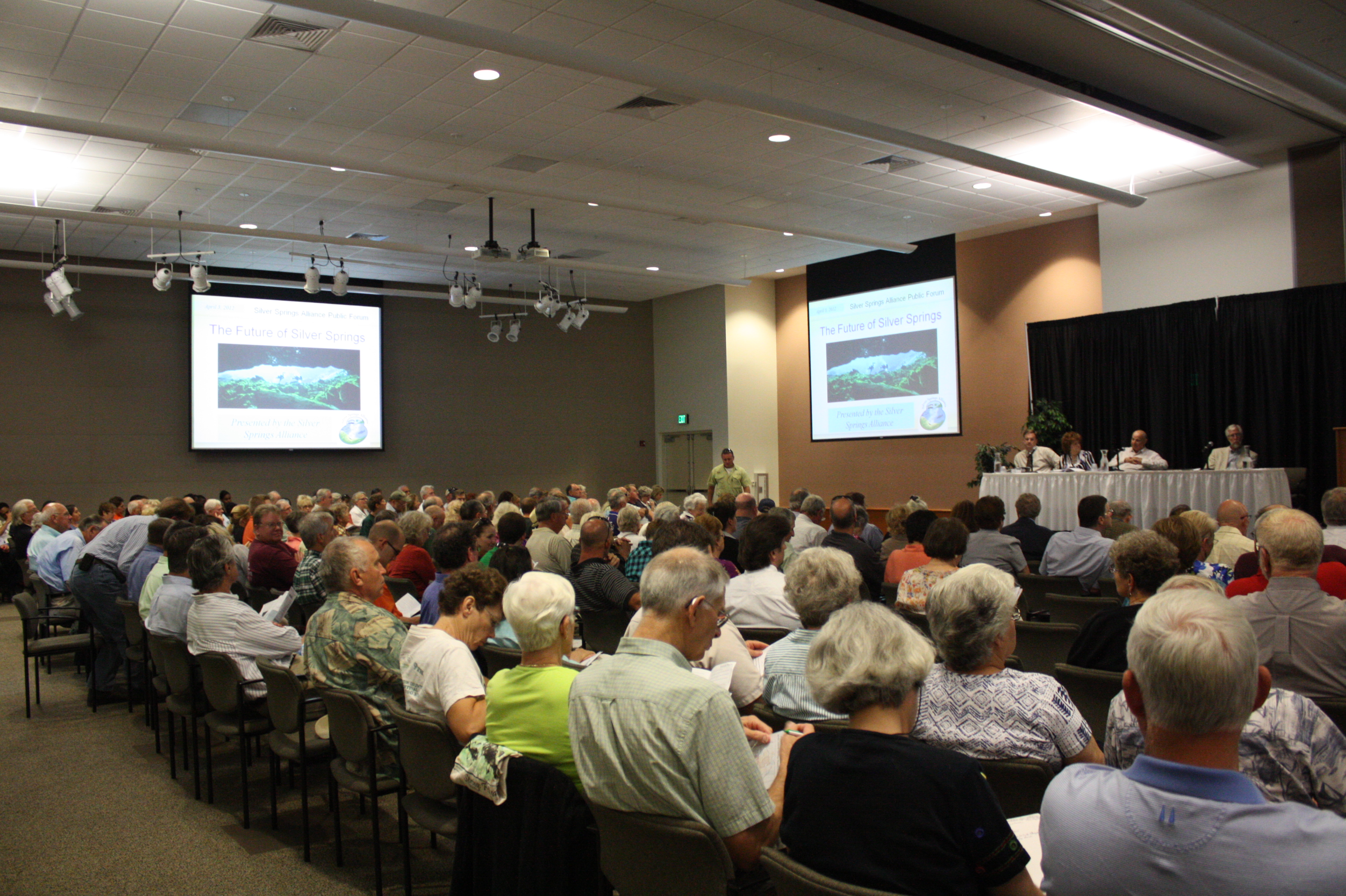A request by Adena Springs Ranch, near Fort McCoy, Fla., to withdraw 13.2 million gallons a day from the Floridan Aquifer is being challenged by hundreds of people in north central Florida.
Owners of the 30,000-acre cattle ranch have applied to the St. Johns River Water Management District to pump more water daily than the 12 million gallons that the city of Ocala withdraws for public use.
The application is currently in the hands of the water management district for review.
Supporters of the project say that it will create local jobs and provide a clean industry for Marion County. Adena Springs Ranch wants the volume of water to irrigate land to raise grass-fed cattle.
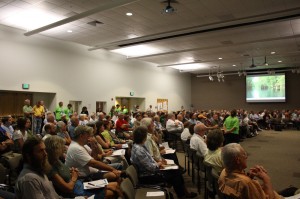
Audience at the April 3 public forum at the Ewers Century Center Klein Conference Room at College of Central Florida on water consumption and the Adena Springs Ranch permit.
Those against the project, as well as those who would like to see the consumptive use permit limit decreased, packed an auditorium at College of Central Florida in Ocala in early April to learn more about the impact of a planned beef operation that includes a slaughterhouse and packing plant. The meeting was organized by the Silver River Alliance, which formed in January 2012 to protect the heritage river and its first magnitude springs. Alliance members and area residents are concerned about the effect Adena Springs Ranch will have on water quality and quantity in the Silver River watershed, which stretches from Leesburg to Melrose and encompasses parts of Ocala National Forest and the Ocklawaha and Silver rivers. ?When I first heard about the grass-fed cattle proposal,? said Diana Kanoy, who owns an adjacent 50 acres. ?It seemed an acceptable alternative if the land were not to be kept as a tree farm, or ideally, allowed to revert to its natural state as a water absorption and regeneration area and corridor for wildlife.? Kanoy became alarmed, she said, when she discovered the extent of the operation and the amount of water it could consume from the Floridan aquifer. The aquifer is a natural underground reservoir that stretches from Florida to South Carolina that supplies nearly 90 percent of Floridians with fresh drinking water. ?This request for vast water consumption forebodes the ominous possibility of our wells drying up, the lakes receding, and even the trees dying, turning our homes and small farms into wastelands, and destroying our work and dreams of pleasant and productive country life,? she said. Stress to Florida?s water supply has become a concern across the state. The Adena Springs Ranch permit request poses another impact on the already stressed aquifer system, panelist Bob Knight said. Knight, director of the Howard T. Odum Florida Springs Institute, said he is not opposed ?conceptually? to the cattle ranch, but that the water use request is excessive. The quantity of the water requested ?represents the most efficient use of water possible for the requested,? attorney Edward de la Parte said in an email response to questions about the project. Some believe the meat production facility, owned by Canadian billionaire Frank Stronach, is being built to take advantage of the lucrative market for grass-fed beef as more and people look for healthy and humane sources of food. Kanoy said some local residents see the ranch as a better alternative to other types of industry that might locate to Florida. Previous proposed use of the property, she said, included ?a paramilitary training camp? that the Marion County Zoning Commission rejected in 2008. In the midst of the current economic slowdown, Adena officials have pointed to jobs as a benefit of the facility, according to speakers at the meeting. Adena officials have estimated, in addition to the construction jobs, the facility will employee about 100 people. In permit requests filed with Marion County, Adena Ranch estimated its capital investment to be around $39 million.
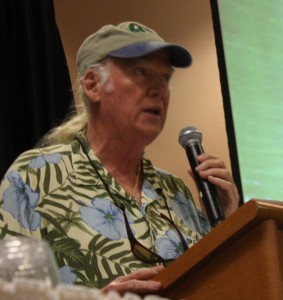
Roy L. ?Robin? Lewis, panelist at the public forum about water consumption and the Adena Springs Ranch.
The operation has already received approval for slaughterhouse and meat processing facilities on one parcel where tree clearing and construction has begun. These activities were challenged in a letter to state officials from St. Petersburg attorney John Thomas on behalf of wetland expert Roy L. ?Robin? Lewis. Lewis?s four-page letter is supplemented by 31 pages of maps, tables, and charts that provide scientific and engineering data about why the Adena Springs Ranch will detrimental to Florida?s ecosystem, threatening springs and rivers as well as ground water quantity and quality. Stronach appears to have a voracious appetite for land, according to a
story from the Canadian news publisher Macleans. He owns more than 70,000 acres around Ocala. With the huge commercial interest in water sales world-wide, a number of people at the meeting asked if the permit could be used for other purposes. If Adena wants to use the permit for something else, they will need to reapply, according to Mike Register, director for St. Johns River Water Management District Division Regulation Services. The permit would be valid for 20 years and with a 10-year compliance review, he added. The management district will likely approve the consumptive use permit, especially in the current political climate, Karen Ahlers said. Ahlers, a Putnam county resident, has retained the Southern Legal Counsel to monitor the permitting process and prepare for a lawsuit if necessary.
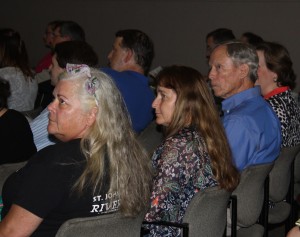
Karen Ahlers, environmental activist; Debby Johnson, paralegal with Southern Legal Counsel; and Buddy McKay, former lieutenant governor and board member Southern Legal Counsel.
?I believe that we need the credible threat of a lawsuit,? which she said ?will encourage the district to do double duty to get it right.? Ahlers is a long-time activist for natural resources in Florida and has fought to restore the Ocklawaha River.
Adena Springs Ranch officials were invited to participate in the two-hour presentations and panel discussions, but declined according to moderator and president of the Silver Springs Alliance, Andy Kesselring. Present at the evening meeting were some members of the Marion County commission, as well as former Florida lieutenant governor Buddy McKay, a board member of the Southern Legal Counsel and a supporter of environmental issues in Florida. ?I am passionate about preserving Florida?s water,? said McKay, best remembered for his work to prevent stop the Cross Florida Barge with Marjorie Harris Carr. Lewis handed over a personal check for $5,000 to Neil Chonin of the Southern Legal Counsel to begin the support for legal action. Ahlers said about $250,000 are needed to monitor the approval process, gather scientific evidence of the negative impacts to water quality and quantity and to prepare a legal case should the permit be approved. ?The threat of a lawsuit and close scrutiny of the application process may be the only way to protect the interests of the public,? Ahlers said. ?We?re in this for the long haul. We will go forward until we have exhausted every legal remedy.? The challenge is not just drinking water, she said, but entire ecosystems. ?This is not just a Marion County issue. It is a statewide issue. A test of whether or not citizens of Florida are going to throw up their hands and allow corporate and political interests to destroy what is left of Florida?s natural resources,? Ahlers said.
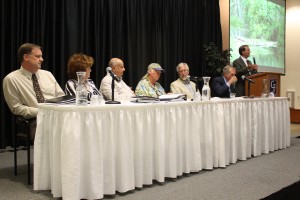
Second group of panelists for the public forum about water consumption and the Adena Springs Ranch. From left to right: Mike Registers, St. Johns River Water Management District; Barbara Fitos, executive director Community Foundation for Ocala Marion County; Neil Chonin, environmental lawyer with Southern Justice Association; Roy L. ?Robin? Lewis, professional wetland scientist; Bob Knight, director of the Howard T. Odum Florida Springs Institute; Guy Marwick, executive director of the Felburn Foundation, and Andy Kesselring, president of the Silver Springs Alliance.
Participants at the meeting asked if irrigation water would filter back to the aquifer. ?That?s not the way it works,? Knight said. Typical overhead irrigation systems lose about? 70 percent of the water to evaporation. Another 10 percent will probably runoff, he said, moving toward the Ocklawaha River, he said giving at rough estimate at that about 20 percent of the water applied would actually recharge the aquifer. ?But what do think a million pounds of cow manure a day will do to the aquifer?? Guy Marwick, panelist and executive director of the Felburn Foundation and founder of the Silver River Museum, said. Florida?s fresh water supply is already threatened by high levels of nitrates from commercial and natural fertilizer, which contaminate springs and possibly the aquifer, according to Knight. Scotty Peterson, a student from Vanguard High School and one of the two student board members of the Silver Springs Alliance, did not think too much of the employment promises by Adena Springs Ranch. Silver Springs alone generates an estimated $60 million a year in tourism and recreation, Kesselring told the audience. ?Consider risking $60 million for 100 jobs?? he said. ?I don?t think so.? Of the 700 comments received by the St. Johns River Water Management District, most have been opposed to the project or requested more information, according to Mike Register, director for Division Regulation Services. De le Parte, however, does not believe the comments represent a sampling of Marion County citizens. Marion County has [331,000] residents, and of the comments received only about 200 from those in the county. The other comments, however, are from people who live within the watershed affected by the projects, as well as from those concerned about drawdown of the Florida aquifer. ?Like many projects of this type, it is much easier for persons to oppose to organize and express concern,? De le Parte said. ?The applicant is convinced there are many more citizens in support of the projects.? A review of the district permitting application for the project turned up very few supportive comments. Marion County commission candidate Butch Verrando, said in an interview that he commended the project for its compatibility with the local environment, its commitment to raising grass-fed beef, and the jobs it will provide for Marion County residents. ?There?s a segment of the population here that wants to push ?ecotourism.? But that does not bring enough dollars to the area,? he said. ?Off-road bikes and kayaks will not pay the bills.? Marion County has a labor surplus and Fort McCoy especially is in need of employment opportunities, he said. Verrando said scientists who are speaking out against the project are ignoring the cycles of rainfall that are a part of Florida?s natural history, he said. Presenters at the meeting pointed to the ongoing drought in Florida as one of the reasons to deny the permit. De la Parte disagrees. ?Variability in rainfall has been the hallmark of Florida?s climate for the past century,? he said. While climate change and sea level rise are a matter of consensus, he said, ?some scientists have predicted an increase in the number and intensity of tropical storms, which would tend to increase rainfall in Florida.? Lawren Moody, a third-generation Ocala resident, supports the project and does not see the water permit as an issue. It ?may sound like a lot, but compared to what industry and agriculture use, it?s not? he said. Verrando determined the water withdrawal amounts to 441 gallons per acre. Mike Register, who spoke on behalf of the water management district said the agency will follow the rules for examining the permit and for reaching a decision on whether or not to grant it. The district is required to give first priority to human consumption of water and second priority to agriculture for human consumption, and so he believes the district has no choice but to grant the permit. Citizens, including Karen Ahlers, who has pledged to fight the permit, said they are willing to protest the permit at every legal opportunity. Register outlined the procedures in detail, including the criteria for denial, the appeal process, and the scientific investigation that will be done to determine if the project will impact water quantity or quality. Ahlers said an appeal of the process must be done within 21 days of determination of the permit request. That?s why, she said, it is important to be prepared.
zp8497586rq




